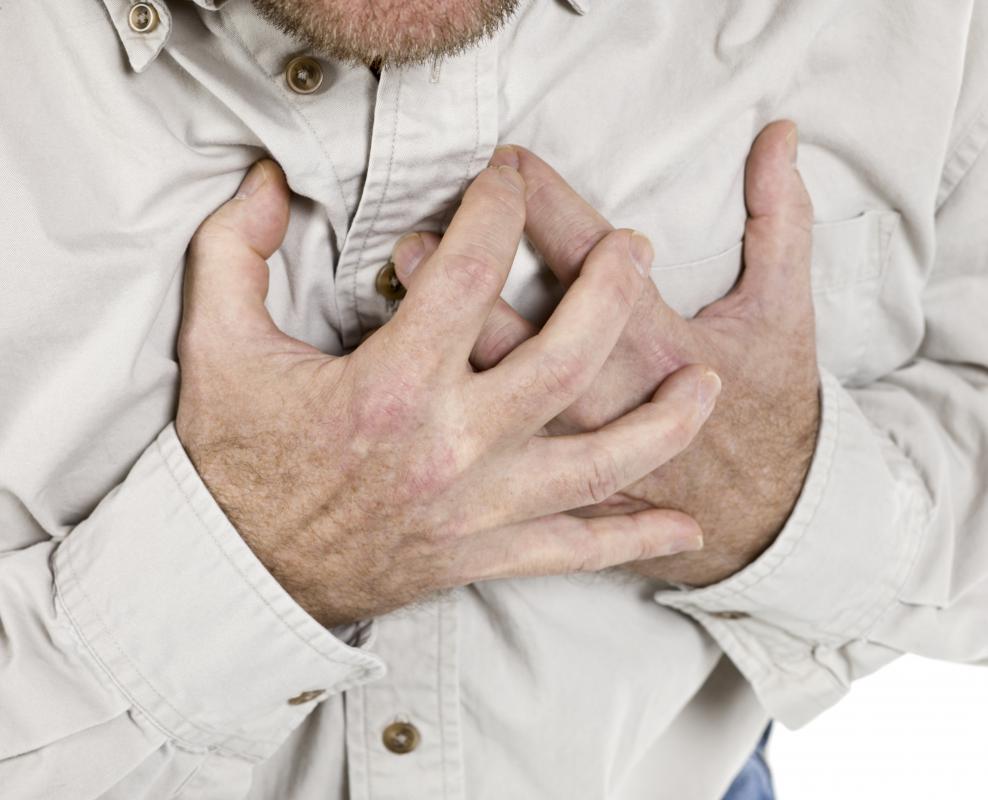At TheHealthBoard, we're committed to delivering accurate, trustworthy information. Our expert-authored content is rigorously fact-checked and sourced from credible authorities. Discover how we uphold the highest standards in providing you with reliable knowledge.
What is Hyperventilation?
Hyperventilation is over-breathing, which usually means that a person is taking rapid, short breaths using mainly the lungs, rather than deep slow breaths using the diaphragm. The condition is often caused by panic attacks or anxiety disorder, but it can be caused by more severe conditions. Anyone who hyperventilates for more than a couple of minutes should seek medical attention immediately.
There are many serious medical conditions that can cause this type of breathing. In addition to panic and anxiety disorder, asthma, chronic obstructive pulmonary disease (COPD), pneumonia, congestive heart failure, heart attack, and drug overdose may all cause the problem. People going into diabetic comas, experiencing ketoacidosis, can hyperventilate too. Occasionally, pregnant women breathe this way because of increasing pressure on the lungs as an unborn child grows.

Since so many conditions — some of them quite risky — can result in over-breathing, a first case of anything longer than a minute or two is always an indication that some condition needs to be diagnosed. For certain conditions like pneumonia, congestive heart failure, heart attack, or ketoacidosis, serious problems may arise if the condition is ignored. For others, hyperventilation is a common occurrence. Once a person has been diagnosed with one of its main causes, panic or anxiety disorder, it isn’t necessary to go to a healthcare professional each time.

As long as this type of breathing is caused by anxiety disorder or panic attacks, individuals can usually manage bouts of it at home. The trouble is that hyperventilating can create more panic, and panic then creates more hyperventilating. It is helpful for people to have tools they can use, generally learned through therapy, that can allow them to relax their breathing. It can help to have someone present who can assure the person that everything will be okay. Since the problem can occur when people are alone, however, they should work on developing a little mental script that they can use to reassure themselves — this is temporary and the person can control it.

A common misconception about hyperventilation is that the rapid breathing it produces is the body's way to get more oxygen. In fact, the opposite is true. This type of breathing leaves the body with too little carbon dioxide as compared to the amount of oxygen it has. While the body takes in oxygen (O) and releases carbon dioxide (CO2), it needs to maintain a certain O-CO2 balance in the blood. That balance is disrupted when a person breathes quickly and shallowly.

Individuals can stop by forcing themselves to take slow, deep breaths from the diaphragm, rather than continue with the short, shallow breaths from the lungs. By breathing slowly, he or she will retain more CO2 and restore the proper O-CO2 ratio in the blood. It may also help the person to slowly breath in and out of pursed lips, which will also help retain more carbon dioxide. Breathing into a paper bag can also help, since the air blown out into the bag is mostly carbon dioxide, and then breathing that back in means getting more CO2. Individuals should use this approach cautiously, however, because doing it for too long could cause them to retain too much CO2, causing the opposite imbalance. Some medical professionals advise against this approach as a result.

Those who experience frequent hyperventilation may find help in working with a mental health professional to learning breathing relaxation techniques. These techniques are also available on tape. Learning yoga breathing can also help, as does regular exercise to reduce panic. Medications to treat anxiety disorder may be of significant assistance when they are coupled with therapy designed to reduce panic.
AS FEATURED ON:
AS FEATURED ON:

















Discussion Comments
@lapsed - First of all, you should try not to fall into the trap of diagnosing yourself online. By all means do your own research, but always see a doctor if you are concerned about something.
If you have been experiencing hyperventilation and you do get diagnosed with an anxiety disorder, there are a number of different treatments available. Like the article says, some are as simple as breathing techniques. Seeing a therapist might help.
In terms of medication, you have to be careful. Benzodiazepines, the most famous class of anti-anxiety medication, is known to be very effective but they carry with them a whole host of side effects. You've probably heard of drugs like Valium or Xanax. The main issue is tolerance; the longer you take it, the more your brain becomes accustomed to it, the more you need to take.
So personally, I would try the non-medicated route first of all and then if that's unsuccessful talk to your doctor about alternative options.
I think I might have an anxiety disorder because this has happened to me a few times when I've been really stressed out and it's pretty scary. What kind of treatment is available and is it likely to be successful?
They sound similar but this is not to be confused with hypoventilation, which is essentially the opposite of hyperventilation; hyperventilation is over-breathing, hypoventilation is under-breathing. Both conditions are serious, however hypoventilation is more commonly caused by side effects of drugs, such as an overdose of painkillers or mixing alcohol with sedating medications. You may have heard of it being referred to as respiratory depression. It's often considered life threatening.
Post your comments